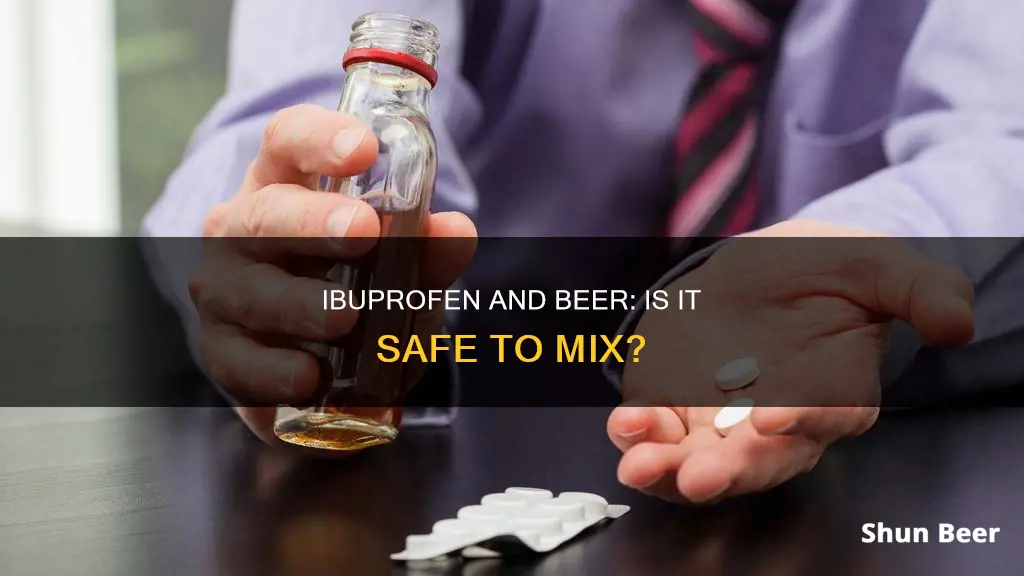
Mixing substances, even when they are legal, is risky. Both alcohol and ibuprofen irritate the stomach and digestive tract, so combining them increases the risk of ulcers and gastrointestinal bleeding. In addition, ibuprofen can affect the kidneys in some people with additional health issues, and alcohol, which can cause dehydration, may increase this risk. Other risks include impaired responsiveness, kidney damage, liver damage, and cardiovascular problems. However, consuming a small amount of alcohol while taking ibuprofen is generally considered safe.
| Characteristics | Values |
|---|---|
| Is it okay to drink beer after taking ibuprofen? | Generally, drinking a small amount of beer after taking ibuprofen is considered safe. However, drinking heavily while taking ibuprofen may lead to serious side effects. |
| How long should you wait after taking ibuprofen to drink beer? | It is recommended to wait at least 10 hours after taking ibuprofen to drink beer. Some sources suggest waiting 24 hours or even 72 hours. |
| Risks of drinking beer after taking ibuprofen | Increased risk of gastrointestinal bleeding, kidney damage, liver problems, decreased alertness, and reduced effectiveness of ibuprofen. |
What You'll Learn

The dangers of mixing ibuprofen and alcohol
Ibuprofen is a nonsteroidal anti-inflammatory drug (NSAID) that is used to relieve pain, swelling, and fever. It is available over the counter under brand names such as Advil, Midol, and Motrin. While taking the recommended dose of ibuprofen with a small amount of alcohol is typically not a cause for concern, regular or excessive consumption of alcohol with ibuprofen can have serious adverse effects.
Gastrointestinal Bleeding
A study of 1,224 participants showed that regular ibuprofen use increased the risk of stomach and intestinal bleeding in people who consumed alcohol. This risk is heightened for those who take ibuprofen for extended periods or in high doses. Both alcohol and ibuprofen irritate the stomach and digestive tract, and combining them further increases the risk of ulcers and bleeding. Signs of gastrointestinal bleeding include ongoing stomach pain, tarry stools, and blood in vomit.
Kidney Damage
Long-term use of alcohol is known to damage kidney function, and the same is true for long-term use of ibuprofen. Consuming them together significantly increases the risk and severity of kidney damage. People with pre-existing kidney issues are particularly vulnerable to this. Signs of kidney damage include drowsiness, swelling of the hands and feet, and shortness of breath.
Lack of Alertness
Ibuprofen and alcohol are both central nervous system depressants, meaning they can cause drowsiness and decreased alertness. When combined, these effects are amplified, leading to an increased risk of accidents, impaired driving, and slowed reaction times.
Less Effective Medication
Mixing alcohol with ibuprofen can also reduce the effectiveness of the medication while intensifying its side effects. This means that the desired pain-relieving effects of ibuprofen may be diminished, while the negative side effects are heightened.
In summary, while an occasional glass of beer with ibuprofen is usually considered safe, regular or excessive alcohol consumption with ibuprofen can lead to serious health risks. It is important to follow the recommended dosage and frequency of ibuprofen and always consult a doctor if you have any concerns about mixing medication with alcohol.
Antidepressants and Alcohol: Is It Safe to Mix?
You may want to see also

How long after taking ibuprofen can you drink alcohol?
It is generally advised to wait for at least 10 hours after taking ibuprofen before drinking alcohol. This is because ibuprofen has a half-life of about 1.9 to 2.2 hours, and it takes around 4 to 5 half-lives for the body to eliminate the medication.
However, the time you should wait also depends on the amount of alcohol you plan to consume. According to the CDC, moderate alcohol consumption is defined as up to two drinks per day for men and one drink per day for women. Within these limits, it is usually safe to consume alcohol while taking ibuprofen. Nevertheless, it is important to exercise caution as combining the two can increase the risk of kidney damage, liver problems, and gastrointestinal bleeding, especially in individuals with pre-existing conditions or a history of gastrointestinal issues.
If you have been drinking alcohol, it is recommended to wait at least 24 hours before taking ibuprofen. This is because alcohol can remain in your system for about 24 to 25 hours, and the combination of alcohol and ibuprofen can be harmful.
Alcohol-Free Beer and Children: Is It Safe?
You may want to see also

The side effects of drinking alcohol with ibuprofen
While consuming a small amount of alcohol while taking ibuprofen is typically considered safe, regularly drinking heavily while taking ibuprofen can have serious side effects. Here are some of the potential dangers of drinking alcohol with ibuprofen:
Gastrointestinal Bleeding
A study of 1,224 participants showed that regular ibuprofen use increased the risk of stomach and intestinal bleeding in people who consumed alcohol. People who drank alcohol but only occasionally used ibuprofen did not have this increased risk. Signs of gastrointestinal bleeding include ongoing stomach pain, tarry stools, and blood in vomit.
Kidney Damage
Long-term alcohol use is known to damage kidney function, and long-term ibuprofen use can have the same effect. Consuming both together significantly increases the risk and severity of kidney damage. People with underlying medical conditions, such as liver or kidney disease, high blood pressure, or heart failure, are most at risk. Signs of kidney damage include drowsiness, swelling of the hands and feet, and shortness of breath.
Increased Drowsiness and Lack of Alertness
Both alcohol and ibuprofen can cause drowsiness, and combining them may lead to excessive sleepiness or an inability to function normally. This can result in an increased risk of accidents, impaired driving ability, and slowed reaction times.
Less Effective Medication
Mixing alcohol with medications can reduce their effectiveness while also intensifying their side effects. This means that ibuprofen may not work as well when combined with alcohol, and its side effects may be more severe.
Older Adults at Greater Risk
The National Institute on Alcohol Abuse and Alcoholism reports that older adults are at greater risk of complications when mixing medication and alcohol. This is because the body becomes less able to break down alcohol with age, and older adults are also more likely to be taking medications that could interact negatively with alcohol.
Beer and Painkillers: A Risky Mix?
You may want to see also

The risk factors of mixing ibuprofen with alcohol
While consuming a small amount of alcohol while taking ibuprofen is typically considered safe, regular and heavy consumption can have serious adverse effects on your health. Here are some risk factors to consider when mixing ibuprofen with alcohol:
Gastrointestinal Bleeding
Ibuprofen can irritate the digestive tract, and long-term use or high doses may increase the risk of gastric ulcers or bleeding in the digestive tract. Alcohol also irritates the stomach and digestive tract, and when combined with ibuprofen, the risk of ulcers and bleeding increases significantly. Signs of gastrointestinal bleeding include ongoing stomach pain, tarry stools, and blood in your vomit.
Kidney Damage
Long-term alcohol consumption is known to impair kidney function, and regular use of ibuprofen can have a similar effect. Consuming them together greatly increases the risk and severity of kidney damage. People with pre-existing kidney issues are particularly vulnerable to this. Signs of kidney damage include drowsiness, swelling of the hands and feet, and shortness of breath.
Lack of Alertness
Both ibuprofen and alcohol can cause relaxation and drowsiness. When combined, they may lead to excessive sleepiness, confusion, lack of coordination, slowed reaction times, and impaired driving ability. This mix can increase the risk of accidents and harm to oneself or others.
Reduced Medication Effectiveness
Alcohol can interfere with the effectiveness of ibuprofen, reducing its ability to relieve pain, swelling, and fever. Additionally, alcohol can intensify the side effects of ibuprofen, increasing the likelihood of adverse reactions.
Beer and Diflucan: Is It Safe to Mix?
You may want to see also

How to take medication safely
While it is usually safe to consume a small amount of alcohol with ibuprofen, it is important to know how to take medication safely in general. Here are some detailed instructions on how to do so:
Instructions for Taking Medication Safely:
- Talk to a Healthcare Professional First: Before starting any new medication, it is crucial to consult your doctor or healthcare provider. Discuss your medical history, including any allergies, and current medications or supplements you are taking. Be transparent about your alcohol consumption and any drug use. This information will help the healthcare professional determine if the medication is safe for you and provide specific instructions on how to take it.
- Follow the Prescribed Dosage and Schedule: Adhere strictly to the dosage and schedule provided by your healthcare provider. Do not increase the dosage, thinking it will be more effective, as this can be dangerous and even deadly. Similarly, do not skip doses or take half doses to save money. Take the medication for the entire duration prescribed, even if you start feeling better. If you experience side effects or believe the medication is making you feel worse, consult your doctor.
- Understand the Medicine's Interactions and Side Effects: Know the potential side effects of the medication and be aware of any medications, supplements, or substances, like alcohol, that should be avoided while taking it. Understand the risks associated with mixing different substances. For example, mixing ibuprofen and alcohol can irritate the stomach and increase the risk of ulcers and bleeding.
- Read and Follow the Medicine Label Carefully: Medicine labels provide essential information on how to take the medication safely. Read the label thoroughly and follow the directions for use. If you don't understand the instructions, ask your doctor, nurse, or pharmacist to explain them to you.
- Keep a Record of Your Medications: Make a list of all the medicines, vitamins, and supplements you are taking, including the dosage and timing. Share this information with your doctor and bring it to medical appointments. This helps ensure your healthcare providers have a complete picture of your medication usage and can identify any potential drug interactions.
- Store and Dispose of Medicines Properly: Keep your medicines in a cool, dry place, out of the reach of children and pets. Follow any specific storage instructions on the medicine label, such as refrigeration requirements. Regularly check the expiration dates on your medications and dispose of them safely when they are no longer needed. Many pharmacies and healthcare organizations provide guidelines on how to safely dispose of unused or expired medications.
- Be Cautious When Taking Multiple Medicines: If you are taking multiple prescription drugs or over-the-counter (OTC) medications, be vigilant about potential interactions. Mixing certain drugs can lead to unpleasant and sometimes serious side effects. Always consult your doctor or pharmacist before starting a new medication to ensure it is safe to take with your current prescriptions.
- Do Not Share or Use Another Person's Prescription: Prescription medications are intended for the specific individual for whom they are prescribed. Using someone else's prescription medicine can be harmful and dangerous. Always ensure that your name is on the prescription before taking any medication.
- Be Mindful of Alcohol and Substance Use: Alcohol and substance use can affect how your medications work. Be honest with your doctor about your alcohol consumption and any drug use. If you think you have a problem with substance misuse, seek help from your doctor or a treatment program.
- Ask for Help if Needed: If you have difficulty understanding or remembering your medication instructions, bring a friend or relative to your doctor's appointments. They can help ensure you comprehend the information and provide support for adhering to the medication regimen.
Remember, when it comes to taking medication, always prioritize your health and safety. Consult your healthcare provider if you have any concerns or questions about your medications.
Wade Boggs' Beer Consumption: How Many?
You may want to see also
Frequently asked questions
It is generally not recommended to drink beer or any other alcoholic beverage after taking ibuprofen due to the increased risk of side effects such as gastrointestinal bleeding, kidney damage, and impaired responsiveness. If you must drink, it is advised to wait at least 4-6 hours after taking ibuprofen and to limit your alcohol consumption to moderate levels.
Mixing ibuprofen and alcohol can lead to an increased risk of gastrointestinal bleeding, kidney damage, liver problems, impaired responsiveness, and decreased alertness. Additionally, alcohol can interfere with the effectiveness of ibuprofen and increase the severity of its side effects.
It is recommended to wait at least 4-6 hours after taking ibuprofen before consuming alcohol. Some sources suggest waiting up to 24 hours or even 72 hours, especially if you have a history of gastrointestinal issues or are at high risk for complications.







